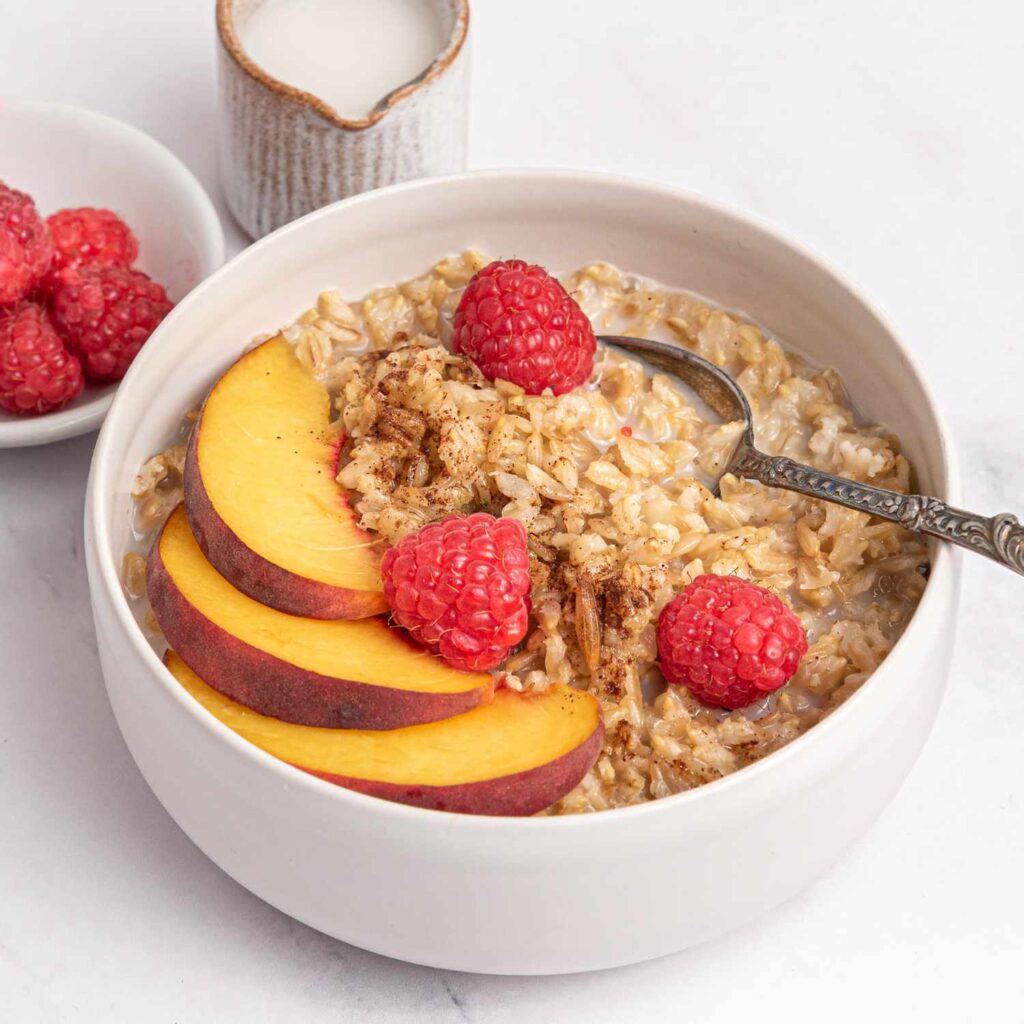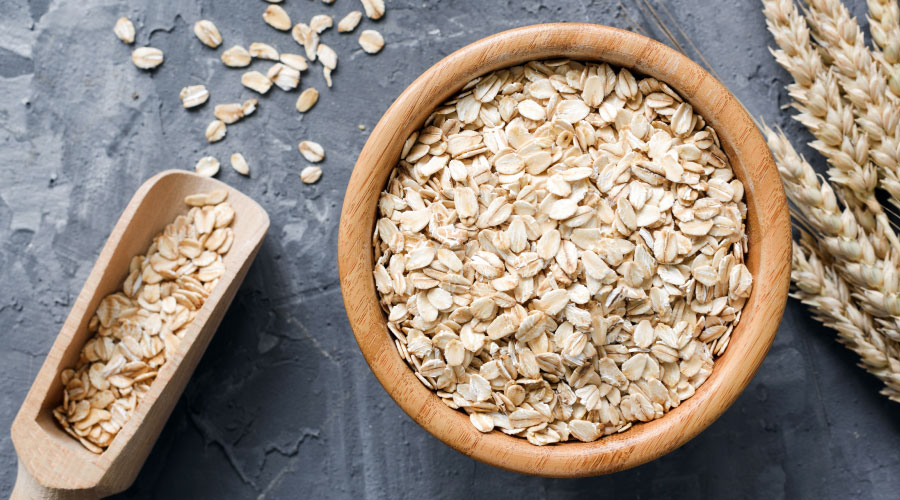Breakfast is one meal you should avoid skipping because it is the day’s most important meal. Most nutritionist recommend oatmeal for breakfast because of its abundant benefits. The good thing with eating oats is their compatibility to be a sweet and savory dish. Either cook yourself a flavored and zingy masala oats or simply add milk, fruits, and nuts. Both ways, you get a powerhouse of nutrients. Here are 10 benefits of oats.
What Are Oats?

Oats are a type of cereal grain derived from the Avena sativa plant. Oats commercially produces include Instants oats, whole oat groats, steel-cut oats, rolled oats, and oatmeal. The most nutritious type of oats are the whole oats, and steel cut oats. Rolled and instant oats aren’t bad either but due to making them ready to cook, much of their nutrients have been reduced in the process. A good quality steel cut oats should easily cook in 15 minutes. The benefit of instant and rolled oats is how you can add them to smoothies, granola bars, or add them to cookies, soups, stews, bread, and cakes.
Oats : A Nutrient-Rich Superfood
Oats pack a nutritional punch and is rich in essential vitamins, minerals, and antioxidants that contribute to overall health and vitality. They are an excellent source of vitamins and which play essential roles in various physiological processes within the body. Additionally, the biggest benefits of oats are the presence of B vitamins involved in energy production and nervous system function. Furthermore, oats contain plant compounds such as phytochemicals and polyphenols, making it a potent antioxidant food to combat oxidative stress and protect cells from damage. By incorporating oats into your diet, you can ensure that your body receives a myriad of essential nutrients vital for optimal health and well-being. Here’s a breakdown of the nutrient composition:
One cup of prepared oatmeal 81 gms or (one half cup dry oats with water) contains:
- Carbohydrate 54.84 g
- Fiber 8.18 g
- Sugars 0.80 g
- Net carbs 46.66 g
Vitamin and Minerals present in Oats include:
- Manganese
- Phosphorus
- Magnesium
- Copper
- Iron
- Zinc
- Folate
- Vitamin B1 (thiamin)
- Vitamin B5 (pantothenic acid)
- Smal amounts of calcium, potassium, vitamin B6 (pyridoxine), and vitamin B3 (niacin)
8 Benefits of Oats
1. Heart Health
One of the best benefits of oats is heart health. Packed with soluble fiber, oats work wonders in lowering LDL cholesterol. The soluble fiber in oats known as beta-glucan, forms a gel-like substance in the digestive tract, which binds to cholesterol and prevents its absorption into the bloodstream. By reducing LDL cholesterol, oats promotes heart health by reducing the risk of cardiovascular diseases such as heart attacks and strokes. Dietary lignans and vitamin E present in oats also protects against heart disease.
2. Antioxidants
The antioxidants present in oats, particularly avenanthramides, exhibit anti-inflammatory properties that further support heart health by reducing inflammation within the arteries. Moreover, oats are rich in polyphenols, plant compounds known to benefit health. According to studies, avenanthramides can help decrease blood pressure by increasing nitric oxide gas, a molecule which helps widen blood vessels, thus improving circulation
3. Blood Sugar Regulation
For individuals grappling with diabetes or seeking to stabilize blood sugar levels, oats offer a natural and effective solution. The soluble fiber in oats slows down the digestion and absorption of carbohydrates, preventing sudden spikes in blood glucose levels. This beneficial impact is primarily linked to beta-glucan’s capacity to create a dense gel, thereby prolonging stomach emptying and the uptake of glucose into the bloodstream. The process provides sustained energy and prevents the energy crashes often associated with refined carbohydrates. Moreover, studies have shown that regular consumption of oats may improve insulin sensitivity, thereby enhancing the body’s ability to utilize glucose efficiently. By incorporating oats into your diet, you can better manage blood sugar levels and reduce the risk of type 2 diabetes.
4. Gut Health Booster
A flourishing gut microbiome is essential for overall health and well-being, and oats play a pivotal role in nurturing a healthy digestive system. The fiber found in oats acts as a prebiotic, providing nourishment for beneficial gut bacteria and promoting their growth and proliferation. Oats help maintain optimal digestive function, alleviate constipation, and reduce the risk of gastrointestinal disorders such as diverticulosis and irritable bowel syndrome (IBS).
Beta-glucan in oats has been shown to possess immune-modulating properties, enhancing the body’s immune response, and promoting immune system resilience. By incorporating oats into your diet, you can cultivate a thriving gut ecosystem and fortify your body’s natural defenses against illness and disease. Moreover, oatmeal contains glutamine, an amino acid known for its gut protecting properties.
5. Satiety and Weight Management
Among the benefits of oats is weight management. Owing to its high fiber content and unique composition of complex carbohydrates and protein, oats have a satiating effect that helps stave off hunger cravings and keep you feeling fuller for longer. The slow digestion of oats prolongs the sensation of fullness, preventing overeating and unnecessary snacking between meals. Additionally, oats have a low glycemic index (GI), meaning they have a minimal impact on blood sugar levels, making them an ideal choice for those watching their weight or aiming to shed excess pounds. Make oatmeal part of your breakfast routine or incorporating oats into savory dishes to support your weight management goals.
6. Oatmeal and Skin Conditions
Oatmeal can be very beneficial for treating inflammatory conditions such as irritation, eczema, etc. Being rich in vitamins and minerals like zinc makes oatmeal a natural home remedy for cleansing skin pores of toxins and dirt particles. Oats helps in normalizing blood circulation and assists in the regeneration of skin cells. Manganese in oats helps to reduce swelling and inflammation and promotes the healing of skin wounds, burns, or bruises. Oatmeal applied to skin is a useful and soothing treatment in eczema. Oats has been used for itching and skin diseases for centuries, and in 2003, the USFDA (US Food & Drug Association) approved colloidal oatmeal as a substance for skin healing.
7. Oats prevents constipation
Because oats are a rich source of good soluble and insoluble fiber, it regulates bowel movements and prevents constipation. Include oats in your everyday diet especially at breakfast.
8. Oats could possibly decrease the risk of childhood asthma
Asthma is an inflammatory disorder of the airways which carry air to and from your lungs. It is typically characterized by recurrent coughing, wheezing, and shortness of breath. Some studies have found how eating oats at an early age may protect children from developing asthma. However, more studies are required to completely ascertain this.
Things to Know When purchasing Oats
Oatmeal may be a gluten free food, but commercial production plants might also be processing gluten-based items and other grains containing gluten. Oats which are sold as gluten free contain no more than 20 parts per million of gluten. Ensure you buy gluten free oats especially if you suffer from conditions like celiac disease.

Moreover, instant oats come with added sugar, and salt especially those being marketed as masala oats. If you truly want the benefit of oats, then it is better to purchase unflavored sugar free rolled oats and use them as a savory or sweet meal adding salt and sugar as per your choice. Add health condiments like fruits, nuts and seeds which will further fortify your oats for a truly nutritious meal.

